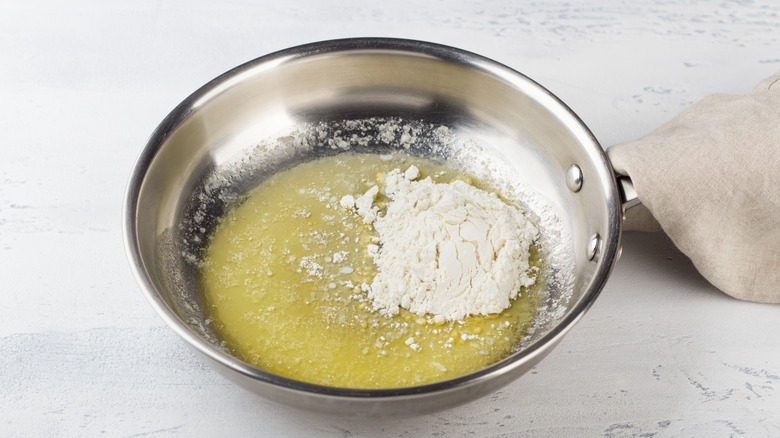What To Be Aware Of When Swapping In Flour For Cornstarch
Cooking is an intricate science, which explains why our pantries are stocked with so many miscellaneous white, powdery substances. From baking powder and baking soda to cream of tartar, it's hard to keep track and stock of all of these ingredients, so we often search for substitutes. Cornstarch, an ingredient from the white, powdery substance species, creeps up on home cooks in unsuspecting recipes. So, if your pantry is devoid of cornstarch, there's a reliable substitute that's probably already in there: flour.
Flour is among the most common substitutes for cornstarch — it's versatile, has nearly the same physical qualities, and affects dishes in similar ways. Cornstarch and flour are often used as thickening agents. However, cornstarch's thickening power is two times that of flour, so when substituting flour for cornstarch, double the amount of starch that the recipe indicates.
When cornstarch is used in a recipe to thicken liquids like a sauce or a stew, flour is a suitable substitute, but there are certain caveats that may affect your choice of substitute.
When and when not to use flour
Though cornstarch and flour are both useful as thickeners, they do so in different ways. For instance, cornstarch is useful when turned into a thickening slurry — a combination of water and starch — whereas flour needs to be cooked down to remove its pasty flavor, such as in roux. It's also important to note that cornstarch gives sauces a glossy, silky finish, and flour results in a heavier, more opaque sauce. In a pinch, flour will work, but the texture and appearance will be different. In sauces where a glossy finish is not necessary like dairy-based sauces, flour works particularly well. On the other hand, flour does not substitute cornstarch well in baked goods — it lends a dense and rough texture.
Different types of flour also yield different results. Whole wheat flour adds a bready flavor, which can be skillfully used in certain cases. Bread flour is less useful as a thickening agent, as it has a lower starch content.

